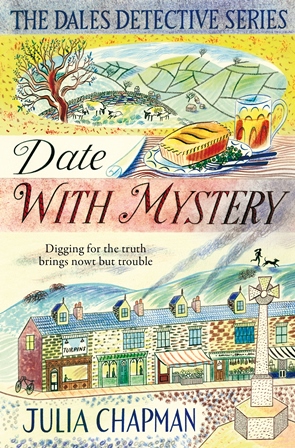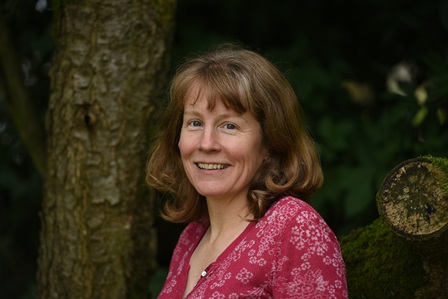Some would say I’ve had it easy when it comes to choosing a setting for my writing. I based my first novels in the stunning French Pyrenees, where I was living at the time.

As that series came to a natural end, I moved to the north of England where I fell in love with this amazing part of the world. While I was trying to plot murder in a large city, I was constantly noticing the shade of the heather on the fells as September bleeds into October. Instead of turning my thoughts to the voices of the urban characters I was supposed to be creating, I was hearing the first call of the curlew as spring arrives. And rather than describing crowded streets and the mayhem of city life, my eyes were drawn to the rainbow colours on the ewes’ rear ends as the breeding season got into full swing! The landscape and its inhabitants got under my skin. How could I not write about them?
It should come as no surprise, then, that my latest series takes place against the backdrop of the Yorkshire Dales. But while living and working in two such glorious backdrops did influence my choice of location when it came to my writing, not everyone can match the place they live in with the world they want to write about. So how do you go about choosing the perfect setting for your fiction?
First of all, make sure it fits. Trying to shoehorn a plot into a place just because you like it – or want your holidays there to be tax-deductible - will never work. Soho and its chaotic vibe is a wonderful canvas for Robert Galbraith’s Cormoran Strike, while Cape Town and its tangled politics provides a fascinating context for Deon Meyer’s novels. Yet neither Strike nor Meyer’s Benny Griessel would be as feasible in the bucolic St Mary Mead. Just as Miss Marple would be somewhat out of place in an East End pub!
Next, be aware of limitations. If you choose to set your work in a rural idyll, then think about the restrictions this could impose on your characters and your plot. A lack of public transport can place very real constraints on your ability to move people around your stage, and the lack of anonymity means your plots have to be well thought through. It’s a lot more difficult to convince your readers that a serial killer went unnoticed in a village with a scattering of houses than in a bustling metropolis! Likewise, if you want to imbue your writing with a sense of community, you will probably want to restrict the geographical borders of the world in which you set it. While Cheers managed to convince us that there could be a pub in Boston where everyone knows your name, it wouldn’t be as credible if the inhabitants of an entire street in that city knew each other.

If the setting for your work is to be believable then another important point is to know it. In the age of the internet there is no excuse for not doing your research, especially if you are using a real locale. There is nothing more annoying for readers, particularly those native to the area you’re writing about, than factual errors. Send cars up a one-way street at your peril!
Leading on from research, if you’re going to put a lot of effort into establishing the perfect location for your book then make sure you use it to its full potential. A good setting, well established and justifiable, can become a character in itself. Think about how the seasons influence the backdrop and how the weather can be employed to add spice to your scenes. Plots can be twisted by something as simple as a wrong turn up a dead-end street or breaking down outside a deserted hamlet, while the passage of time can change an urban setting from the frantic hubbub of rush hour to the relative calm of night-time. Keep it varied and make it work for you, and you’ll find your readers become as entranced by the background as by the action happening centre stage.
Finally, you need to love it. If you’re not interested in the scenery against which you’ve chosen to set your writing and fail to invest the effort required to make it authentic, it will show. I’m not for one minute suggesting you have to want to live there – simply that you need to see the importance of it within your work.
So, there you have it – my potted guide to choosing the right location for your work. And of course, if you are so lucky as to live in the world you write about then there’s another bonus – I’m off for a run on the fells and I get to call it research! Happy writing.
Julia Chapman is the author of Date with Mystery, the third novel in the Dales Detective Series, was published in 2018. You can follow Julia on Twitter at @DalesWriter, visit her website www.jstagg.com and find her on Facebook.
Comments